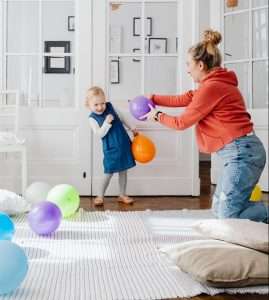 Q: Our bedtime pattern seems to be my 4-yr-old daughter pushing limits until there’s a consequence; then she sulks. Two nights ago, for example, she had a couple of little stuffed animals that she was giving voices to that kept interrupting story-time. I said she could hold onto them as long as they didn’t interrupt but they’d have to go downstairs until tomorrow if they couldn’t be quiet. Of course they weren’t. Last night she got a balloon out and was playing with it and wouldn’t put it away. Same thing until I raised my voice. She is getting very silly and defiant around bedtime, often with her older sister’s encouragement. Any ideas?
Q: Our bedtime pattern seems to be my 4-yr-old daughter pushing limits until there’s a consequence; then she sulks. Two nights ago, for example, she had a couple of little stuffed animals that she was giving voices to that kept interrupting story-time. I said she could hold onto them as long as they didn’t interrupt but they’d have to go downstairs until tomorrow if they couldn’t be quiet. Of course they weren’t. Last night she got a balloon out and was playing with it and wouldn’t put it away. Same thing until I raised my voice. She is getting very silly and defiant around bedtime, often with her older sister’s encouragement. Any ideas?
A. It’s your interpretation that she pushes to get you angry or until there’s a consequence. Almost all kids push or act out to be heard and accepted. Nothing she is doing here is wrong. It’s simply an inconvenience—but it is unacceptable to you.
Read over this question and see that your daughter is being reprimanded for playing. Yes, it’s disruptive to what you want, but it is play. And she wants your engagement in that play.
Instead of thinking it’s wrong for her to interrupt story time, ask yourself why she is not interested and what she is trying to say with the voices of her animals. By telling her the animals will go downstairs if they don’t stop, you are shutting her voice down and stopping valuable play.
It’s not always easy to figure out what behavior is trying to tell us. But consequences always stop a child from doing what they’re doing—what they’re trying to tell us. We rarely take the time to focus on why they are doing what they’re doing—what it is that provokes the disruptive behavior. Their behavior is always a signal to you about something rather than an end in itself. It’s that something that is the key. Don’t cut off connection to that valuable piece.
Even though it might be annoying for her sister or you to stop the story and address the issue, it would have been great modeling to pay attention. You could try, “Sounds like your animals don’t like this story. I wonder if they have a story of their own they want to share with us. Shall we listen to what they have to say for a couple minutes?” Giving her the chance to get into her play might give her the opportunity to say something that could be quite revealing to you. There is so much we miss from our children when we don’t give them the chance.
It’s always our agendas and expectations that get in the way of listening to our children. We have a picture, an idea, of how things should go. And if reality doesn’t meet that, most of us get annoyed and even punitive. Being in the moment means to truly pay attention to what your child is presenting you with. It means being flexible enough to put your agenda aside, shift gears, and watch and listen.
 I would suggest for at least a couple weeks that you pay special attention to actively playing with her. It’s really wonderful for children if you go to them and say, “I have 15 minutes (however much you can give) before I need to do… and I want to spend it with you. What would you like to do?” The important piece is that you let her lead and you give her 100% of your attention. If you choose the time, it’s easier to give your full attention. Watch her, listen to what she does and says. Let her direct your play, your dialogue. I’d be curious to know if a couple of weeks of this every day would make a difference in her attention at bedtime.
I would suggest for at least a couple weeks that you pay special attention to actively playing with her. It’s really wonderful for children if you go to them and say, “I have 15 minutes (however much you can give) before I need to do… and I want to spend it with you. What would you like to do?” The important piece is that you let her lead and you give her 100% of your attention. If you choose the time, it’s easier to give your full attention. Watch her, listen to what she does and says. Let her direct your play, your dialogue. I’d be curious to know if a couple of weeks of this every day would make a difference in her attention at bedtime.
Play is our children’s language. It is through play that they process just about everything about the world they are watching. They learn social relationships, math configurations, problem solving, spacial relationships, and develop language skills among so much more.
 We are taking play, especially unsupervised play, away from children so they are robbed of learning valuable skills. We supervise everything they do; we provide the rules and parameters. We tell them when they’re not doing it right so they don’t learn to do that with each other. They are having fewer opportunities to find agency in their lives—another benefit of play—and more and more we see older kids unable to take responsibility for themselves and their choices. Yes, this is also learned through play.
We are taking play, especially unsupervised play, away from children so they are robbed of learning valuable skills. We supervise everything they do; we provide the rules and parameters. We tell them when they’re not doing it right so they don’t learn to do that with each other. They are having fewer opportunities to find agency in their lives—another benefit of play—and more and more we see older kids unable to take responsibility for themselves and their choices. Yes, this is also learned through play.
That said, it could be a simple solution. Your daughter could just be bored with the story you’re reading and/or has a hard time sitting still. Perhaps it’s difficult to find reading that suits both her and her older sister. If her sister is encouraging the silliness, it sounds like that needs addressing before they are able to sit and listen. I know bedtime is important but so is playtime. Can you start the bedtime process 15 minutes earlier and encourage some raucous play before reading?
Regardless of the solution that “works” to keep your girls engaged and calm before bed, be sure and give a great deal of credence to the “obstructive” play that is frustrating you. Look at it as a message and you may learn some things about your girls.
Related articles you may find helpful:







